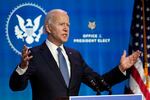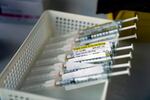With COVID-19 surging and vaccinations off to a slow start, President-elect Joe Biden will rapidly release most available vaccine doses to protect more people, his office said Friday, a reversal of Trump administration policies.
“The president-elect believes we must accelerate distribution of the vaccine while continuing to ensure the Americans who need it most get it as soon as possible," spokesman T.J. Ducklo said in a statement. Biden “supports releasing available doses immediately, and believes the government should stop holding back vaccine supply so we can get more shots in Americans’ arms now.”

President-elect Joe Biden speaks during an event at The Queen theater in Wilmington, Del., Thursday, Jan. 7, 2021, to announce key nominees for the Justice Department.
Susan Walsh / AP
Biden’s plan is not about cutting two-dose vaccines in half, a strategy that top government scientists recommend against. Instead, it would accelerate shipment of first doses and use the levers of government power to provide the required second doses in a timely manner.
The Trump administration has been holding back millions of doses of vaccine to guarantee that people can get a second shot, which provides maximum protection against COVID-19. Both the Pfizer-BioNTech and Moderna vaccines require a second shot after the first vaccination. One-shot vaccines are still undergoing testing.
A recent scientific analysis in the journal Annals of Internal Medicine estimated that a “flexible” approach roughly analogous to what Biden is talking about could avert an additional 23% to 29% of COVID-19 cases when compared to the “fixed” strategy the Trump administration is following. That’s assuming a steady supply of the vaccine.
After a glow of hope when the first vaccines were approved last month, the nation's inoculation campaign has gotten off to a slow start. Of 21.4 million doses distributed, about 5.9 million have been administered, or just under 28%, according to the Centers for Disease Control and Prevention.
Biden has already indicated his displeasure with the progress of vaccinations. In a speech last week, before his election victory was certified by Congress, the president-elect said he intends to speed up vaccinations by having the federal government take a stronger role to make sure that vaccines are not only available, but that shots are going into the arms of more Americans.
“The Trump administration plan to distribute vaccines is falling behind—far behind,” Biden said. “If it continues to move as it is now, it’s going to take years, not months, to vaccinate the American people.”
The American Hospital Association estimates that the nation would need to vaccinate 1.8 million people a day, every day, from Jan. 1 to May 31, to reach the goal of having widespread immunity by the summer. That's also called “herd immunity” and would involve vaccinating at least 75% of the population.

In this Jan. 7, 2021, file photo syringes containing the Pfizer-BioNTech COVID-19 vaccine sit in a tray in a vaccination room at St. Joseph Hospital in Orange, Calif. Taking a new direction to speed release of coronavirus vaccines, President-elect Joe Biden's office said Friday he would end the current practice of holding back vaccine doses to guarantee that people who get their first shot can also get a required second inoculation three weeks later.
Jae C. Hong / AP
Without spelling out details, Biden said his administration will put in place a much more aggressive vaccination campaign, with greater federal involvement and leadership and the goal of administering 100 million shots in the first 100 days.
He said he and Vice-President elect Kamala Harris have been talking with state and local leaders about a coordinated approach that meshes the efforts of governments at all levels. Among the specifics: opening up vaccination centers and sending mobile vaccine units to hard-to-reach communities.
“The top thing is that there’s not a coordinated national plan,” Biden adviser Dr. Rick Bright told The Associated Press. Bright has a doctoral degree in immunology.
The Biden transition office said its experts believe that pushing out available vaccine as fast as possible will not create problems for people needing their second dose. Biden will make broader use of a Cold War-era law to direct private industry to supply materials for vaccine production, should that become necessary, his office said.
Former Food and Drug Administration head Mark McClellan said he agrees with Biden's decision, but the increased supply of vaccines has to be coupled with steps to get shots actually administered to people.
“We're holding back more doses than we really need to,” McClellan said in an interview. But “this needs to be combined with steps to increase the administration of vaccines, or it won't make much difference.” McClellan, who served under former Republican President George W. Bush, now leads a health policy center at Duke University.
Biden announced his plan after eight Democratic governors wrote the Trump administration on Friday urging it to do as much.
“The federal government currently has upwards of 50% of currently produced vaccines held back,” the governors wrote. “While some of these life-saving vaccines are sitting in Pfizer freezers, our nation is losing 2,661 Americans each day, according to the latest seven-day average. The failure to distribute these doses to states who request them is unconscionable and unacceptable. We demand that the federal government begin distributing these reserved doses to states immediately.”
The letter was signed by Govs. Gretchen Whitmer of Michigan, Gavin Newsom of California, Laura Kelly of Kansas, J.B. Pritzker of Illinois, Tim Walz of Minnesota, Andrew Cuomo of New York, Jay Inslee of Washington, and Tony Evers of Wisconsin.
With the winter wave of the pandemic pushing deaths to record levels, and hospitals overwhelmed in cities large and small, some have called on the government to authorize using just one dose of the Pfizer and Moderna vaccines. That would indeed confer a boost of immunity.
However, government scientists including Dr. Anthony Fauci have said the vaccines should continue to be used as prescribed under their emergency approval by the FDA. The two-shot regimen provides around 95% protection.
More than 365,000 Americans have died as a result of the pandemic, according to data from Johns Hopkins University. The seven-day average positivity rate for the nation has continued to rise since Christmas, and stood at 13.6% on Thursday, according to the COVID Tracking Project. That's well above the 10% rate considered a marker of widespread contagion.
Biden spokesman Ducklo said the president-elect will share additional details next week on how his administration will engage the pandemic when he takes office on Jan. 20.
Biden's plan to change the vaccine distribution plan was first reported by CNN.
___
This story has been corrected to show that 21.4 million doses of vaccine have been distributed, not 29.4 million.
___
AP reporter Michelle R. Smith in Providence, R.I., contributed to this report.
